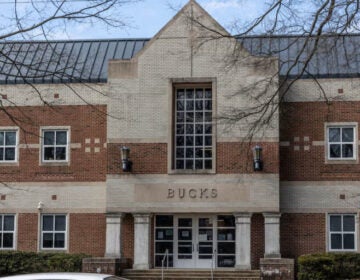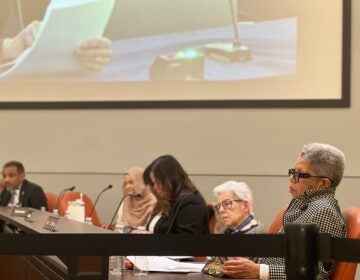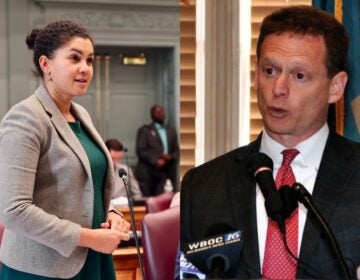‘Sunshine’ questions loom over Philadelphia School Reform Commission resolution
Listen
The School Reform Commission is under fire for its handling of a surprise resolution. (Bastiaan Slabbers
The Philadelphia School Reform Commission is facing widespread questions about whether it acted illegally when it quickly passed a new resolution during its January meeting.
Critics allege the body violated the state’s government transparency laws.
Late into January’s five hour SRC meeting, Commissioner Sylvia Simms introduced a surprise motion. The text of the resolution was not given to the public beforehand, and the body did not invite public comment on that specific resolution before voting.
Simms’ resolution, which immediately passed, resuscitated the idea of converting Germantown’s Wister Elementary to a charter school. Technically, the resolution invited a full application from Mastery Charter Schools to take over Wister.
Superintendent William Hite had pitched conversion of Wister in October, but rescinded his recommendation in early January based on evidence of test score growth at the school.
Those who opposed the conversion felt blindsided by the surprise resolution. Many who otherwise would have come to testify against it say they stayed home because they were assured by the superintendent that conversion was no longer a possibility.
“I do wish I was there, so when she stood up and said what she said, I could have interrupted her and said, ‘How dare you?'” said Wister parent Kenya Nation Holmes.
Was it legal?
Pennsylvania’s Sunshine Act does not require governmental agencies to publish resolution agendas prior to meetings. The SRC typically does so anyway weeks in advance.
But the sunshine law does mandate that the public needs a chance to weigh in on an action before a vote, which Philadelphia City Council President Darrell Clarke says did not happen in this case.
“I believe that is clearly a violation of the Sunshine Act, both in terms of law and in terms of the spirit of the law,” said Clarke.
To Clarke, the move is more evidence that the unelected, state-controlled body should be dissolved. “It is clearly time for it to go away,” he said.
Criticism does not end with Clarke. Mayor Jim Kenney said he was “shocked” by the board’s course of action, and Councilwoman Helen Gym believes there should be a formal investigation.
The Alliance for Philadelphia Public Schools says the circumstances of the vote should nullify its outcome. Co-founder Lisa Haver says this latest action continues a trend. In October 2014, the SRC voted to cancel its contract with the teachers union without first hearing public comment.
“It really tells people that the SRC does not play by the rules. There’s no other governmental body which is allowed to introduce a bill and vote on it one minute later,” said Haver.
School district general counsel Michael Davis disagrees with the criticism in this case. He argues that the SRC got plenty of public input on the idea — even if it came before the formal resolution was authored.
“There was abundant public comment from parents on both sides of that issue for weeks, maybe months before the meeting,” he said.
That argument falls on deaf ears to parents like Holmes, who feel misdirected and railroaded by a move they say sets a worrisome precedent.
“An idea is just that: an idea. You still need a resolution. You still need something written down on paper. You still need to be official,” said Holmes. “They change the rules as they go along, because they make them up. How can I keep up with your rules if everytime you change them to fit your ideas?”
Much of the criticism for the SRC in this case comes from those who tend to oppose the expansion of charter schools, but even outside, neutral observers question the SRC’s action and the district’s legal justification.
“As a matter of best practice, in this case if somebody had come to us and said, ‘Here’s the issue. What do you recommend?’ We certainly would have recommended a more robust process,” said Erik Arneson, the executive director of the state’s Office of Open Records.
The state office trains agencies and governmental bodies in how to comply with the Open Records Law and Sunshine Act. It always urges them to “err on the side of transparency.”
Arneson, a former top Republican legislative aide, agrees with critics who say that actions like these undermine the public’s trust in the integrity of the governmental process.
“It’s easy to understand the frustration,” he said. “I can’t imagine that anybody doesn’t understand the frustration.”
Pennsylvania standards
Without commenting on the specifics of this case, the Pennsylvania School Boards Association explained the protocols for handling proposals that arise mid-meeting.
“Boards can and do verbally add new business during a meeting that would not have been reflected in the circulated agenda. This is perfectly legal and justified because not everything that comes up in a board meeting can be anticipated when written agendas are being created,” said PSBA spokesman Steve Robinson. “In these instances, the chair might opt to open the floor for public comment on such new items, or hold the vote to a later meeting, although practices likely vary.”
Commission chair Marge Neff, who voted against the resolution, did not respond to a request for comment.
Commissioner Bill Green, who voted in favor, somewhat acknowledged that it would have been better to get formal input on the actual resolution.
“In hindsight maybe we should have done that,” said Green. “The previous three meetings people have commented on this exact issue including some people commenting on it that night. I’m not sure we would have learned anything, or it was necessary, but in hindsight I think perhaps it would be better to do that.”
Green added that the SRC actually does not need to pass a resolution to accept an application from a charter school – begging the question why the SRC even voted on resolutions during that meeting concerning Wister, Cooke and Huey elementaries.
In general, Green said that the body during his tenure has been “the most transparent SRC in history.”
Green and other SRC members emphasized that this action merely invites a full application from Mastery. The final vote won’t occur until April — giving the public plenty more chances to weigh in.
Section 710.1 of the Sunshine Act reads:
“The board or council of a political subdivision or of an authority created by a political subdivision shall provide a reasonable opportunity at each advertised regular meeting and advertised special meeting for residents of the political subdivision or of the authority created by a political subdivision or for taxpayers of the political subdivision or of the authority created by a political subdivision or for both to comment on matters of concern, official action or deliberation which are or may be before the board or council prior to taking official action.”
WHYY is your source for fact-based, in-depth journalism and information. As a nonprofit organization, we rely on financial support from readers like you. Please give today.





